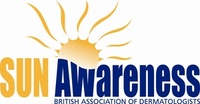Survey reveals Brits unaware of sun damage to skin
 Half of Britons would not recognise the signs of a possible skin cancer, and a quarter never checks their skin for the disease, a shocking snapshot survey by the British Association of Dermatologists has revealed.
Half of Britons would not recognise the signs of a possible skin cancer, and a quarter never checks their skin for the disease, a shocking snapshot survey by the British Association of Dermatologists has revealed.The survey, to launch this year’s Sun Awareness campaign, revealed that a quarter of respondents never examine their body for changes to their moles.
Even more startling, one in six people are not aware that a mole can be checked for free by a GP, instead believing this service has to be paid for.
85 percent of respondents still don’t realise that skin cancers make up a third of all UK cancers, with the majority thinking that less than one in 10 cancers affect the skin.
And despite skin cancer rates increasing faster than any other cancer, with figures doubling every 10 to 20 years, a staggering one in eight people do not know that skin cancer is on the rise at all.
However, it is not just sun exposure that causes cancer, and an alarming one in six believe that sunbeds could be a useful way of producing Vitamin D for the body.
The British Association of Dermatologists states that perceived health gains from sunbed use, such as vitamin D production, can easily be achieved by other means including diet and supplements. It is therefore not felt that sunbeds carry useful health benefits, but instead increase a person’s risk of skin cancer.
President of the British Association of Dermatologists Dr Colin Holden said: “While it is disheartening that there is little understanding about quite how common skin cancer is, what I find of particular concern is that so many people are unaware of certain signs of skin cancer, and furthermore do not know that they can have a suspicious mole checked free of charge. This could pose a huge obstacle to the early detection of skin cancer in these individuals.”
Sun damage and cosmetic appearance:
The survey showed that we are not just ignorant of the health risks of UV exposure – many people are also unaware that sun protection can keep the skin looking younger.
When asked about how to best prevent premature skin ageing, a quarter favoured applying a daily moisturiser, eating a healthy diet, drinking plenty of water or using facial massage and facial exercises over sun protection.
And interestingly, it seems we are a nation still willing to risk our health for our appearance, with over half (56 percent) of respondents finding people with a tan more attractive, and 91 percent thinking that fashion influences people’s sunbathing habits.
Maria Tabou, Sun Awareness campaign officer at the British Association of Dermatologists said: “The vast majority of premature ageing is caused by excess sun exposure. Smoking also ages the skin, but the methods of prevention chosen by a quarter of people – such as using a moisturiser, drinking eight glasses of water a day, facial massage or facial exercises – will have nowhere near the anti-ageing impact of sun protection.
“Many people don’t realise the extent to which UV irradiation can damage the skin. UV has strong links to skin cancer and also affects the elastin in the skin and leads to wrinkles and sun-induced skin ageing, for example leathery skin and uneven pigmentation.”
With skin cancer rates rising faster than any other cancers, the British Association of Dermatologists’ Sun Awareness campaign aims to educate the public and health professionals on ‘early detection’ of skin cancer, and where members of the public can seek help should they be concerned about their skin.
As part of this, the British Association of Dermatologists have created the ABCD-Easy guide to mole checks, to detect the signs of melanoma – the deadliest type of skin cancer. Look out for:
- Asymmetry - the two halves of the area may differ in shape
- Border - the edges of the area may be irregular or blurred, and sometimes show notches
- Colour - this may be uneven. Different shades of black, brown and pink may be seen
- Diameter - most melanomas are at least 6mm in diameter. Report any change in size, shape or diameter to your doctor
- Expert - if in doubt, check it out! If your GP is concerned about your skin, make sure you see a Consultant Dermatologist, the most expert person to diagnose a skin cancer. Your GP can refer you via the NHS
Maria Tabou explained: “While many women are aware of the need to carry out self breast examinations, so few people check their skin for cancer. As skin cancer makes up a third of all cancer, we really need to address this.”

